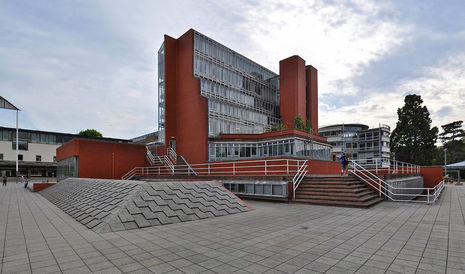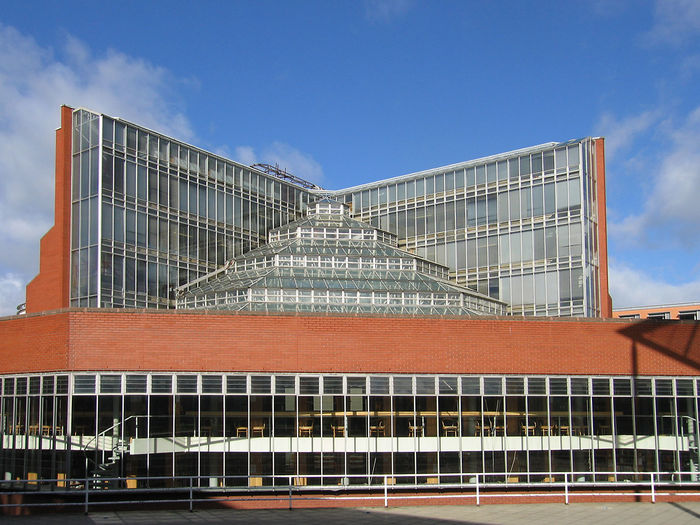Does renaming the Seeley Library go far enough?
Joel Penrose criticises the symbolic nature of the campaign to rename the Seeley Library, arguing that far more than just the name needs to be changed

The Austrian novelist Robert Musil once wrote that “there is nothing in this world as invisible as a monument” and in recent months this has been emphatically demonstrated by the case of the Seeley Library. For that is precisely what the library is: a monument, an eternal reminder of Seeley’s supposed genius. And yet, until recently, the vast majority of students didn’t even know who Seeley was. I myself had assumed that it was an acronym – what for? I didn’t care to find out. For most people “Seeley” was simply a word, not a person, and much less one of any relevance.
All that changed last November with the emergence of the Rename the Seeley Library Campaign when Seeley was rescued from obscurity and thrust into the heart of bitter debate over the nature of Britain’s colonial legacy. Like Churchill and many other venerated historical figures, Seeley was an arch-imperialist convinced of the superiority of European civilisation. His 1883 book The Expansion of England served as an ideological justification for the British empire and contained phrases such as “the ruling race in British India has a higher and more vigorous civilisation than the native races” - ideas so disgusting that they are hard to read.
However, though the campaign strongly argues the case for the renaming of the library, it fails to demand that it be part of an educative process that is ultimately even more significant. The open letter itself admits that renaming the Library is merely a “symbolic act”, a token nod to decolonisation. Though the letter suggests, but does not require, that the University “make it clear what Seeley’s legacy represents” through a book collection on imperialist history, the idea is vague, uninspiring and almost apologetic, tagged on to the letter as an afterthought rather than a serious demand.
“When a statue is torn down the pedestal is left to remain as a visual reminder of what came before”
This is where the open letter fails to hit home. It appears not to realise that the renaming of the library means nothing if it occurs in a vacuum. A newly renamed “History Faculty Library” on its own does not represent a bastion of anti-imperialism. It is the process of changing the name that is significant, a process that must be remembered and immortalised.
Just as when a statue is torn down the pedestal is left to remain as a visual reminder of what came before, the same is true of the Seeley Library today. The renaming of the library is only significant while people remember what name came before, and why it was changed. For Seeley truly to be judged there must be information panels by the doors, leaflets in the foyer, research projects, books, lectures, exhibitions – the list goes on. People must be forced to process old colonial ideas so as to cast our history in a different light. This is what it truly means to come to terms with one’s past: a change of name is simply not enough.
Indeed, it is important that colonialists such as Seeley remain visible to help bring attention to the issue. They must remain there to be tried, humiliated, and pelted with metaphorical rotten tomatoes. Simply renaming the library would brush off a legacy that it is vital to expose. We must envisage what kind of a world we are trying to create – do we really want colonialism to be wiped from the collective memory? Though the renaming of the library is a step in the right direction, it can quickly become counterproductive if it is not explained, contextualised, and embedded in the psyche of the nation.
“The campaign is offering the university an easy way out”
We must look to Germany to grasp what it truly means to come to terms with the past, where the uncovering of the horrors of Nazism was dealt with in an exemplary fashion. In West Germany the Holocaust was not forgotten but rather ingrained in the national consciousness as a subject of constant reflection and reassessment. It took a central place in the national curriculum, was commemorated in countless memorials, and generated a frenzy of impassioned scholarship. This process even has a name, Vergangenheitsbewältigung, and is still an important part of what it means to be German today.
Unfortunately, in Britain such a process has only just begun. A survey in 2020 revealed that only 19% of Brits judged the British Empire as shameful whilst 32% considered it a source of pride. These figures are as predictable as they are shocking. In Britain the Empire is not central to the national curriculum, there are no visible memorials to the victims of imperialism, and the popular scholarship is dominated by the likes of Niall Ferguson, whose eloquent defence of British expansionism tugs on the heartstrings of British patriotism. The overriding attitude to the Empire is emotional, not rational, as very few people have the opportunity to learn about it comprehensively. This can be demonstrated by a simple exercise of inward-reflection: how much do you know about the British empire? The answer in most cases is bound to be not nearly enough.
One thing is clear: Seeley cannot be left to slide into oblivion. By demanding only a simple change of name, the campaign is offering the university an easy way out, implying that decolonisation is a goal which can be achieved with the stroke of a pen. The campaign must reassess its goals to acknowledge the fact that decolonisation is a process, not a mere event. The renaming of the library cannot be left as a “symbolic act”, but must rather be part of an active process of education and reparation. In the words of the great philosopher George Santayana “those who cannot remember the past are condemned to repeat it”. Britain must have its own Vergangenheitsbewältigung, and with regard to the renaming of the Seeley Library, we must begin as we mean to carry on.
 Features / Beyond the porters’ lodge: is life better outside college?24 February 2026
Features / Beyond the porters’ lodge: is life better outside college?24 February 2026 Theatre / Footlights Spring Revue? Don’t Mind if I Do!25 February 2026
Theatre / Footlights Spring Revue? Don’t Mind if I Do!25 February 2026 News / Cambridge academics sign open letter criticising research funding changes22 February 2026
News / Cambridge academics sign open letter criticising research funding changes22 February 2026 News / Student and union protesters hold ‘Trans Liberation Solidarity Rally’ 24 February 2026
News / Student and union protesters hold ‘Trans Liberation Solidarity Rally’ 24 February 2026 Fashion / The evolution of the academic gown24 February 2026
Fashion / The evolution of the academic gown24 February 2026










